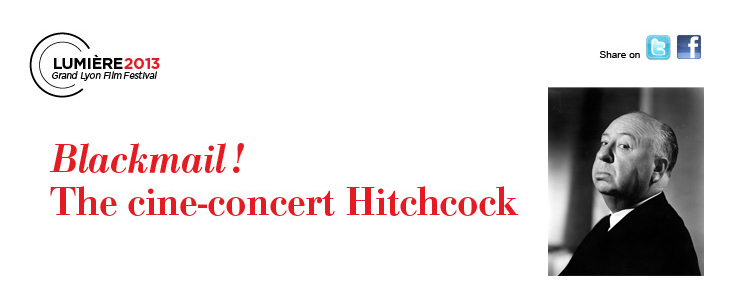

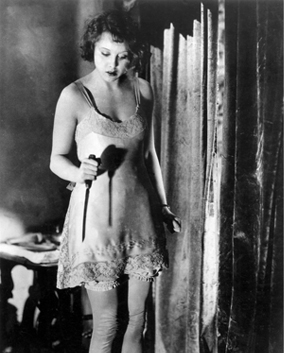 After Tabu by Murnau (1929) in 2009, The Cameraman by Edward Sedgwick and Buster Keaton (1928) in 2010, The Four Horsemen of the Apocalypse by Rex Ingram (1921), and Lulu by Georg Wilhelm Pabst (1929) last year, the masterpiece by Alfred Hitchcock was chosen for this yearly tradition at the Auditorium, accompanied by the National Orchestra of Lyon, in a grand premiere for the festival, led by its music director, the famous American conductor, Leonard Slatkin. After Tabu by Murnau (1929) in 2009, The Cameraman by Edward Sedgwick and Buster Keaton (1928) in 2010, The Four Horsemen of the Apocalypse by Rex Ingram (1921), and Lulu by Georg Wilhelm Pabst (1929) last year, the masterpiece by Alfred Hitchcock was chosen for this yearly tradition at the Auditorium, accompanied by the National Orchestra of Lyon, in a grand premiere for the festival, led by its music director, the famous American conductor, Leonard Slatkin.The programming of the film is part of the series "From silent films to talkies: the silent in talkies, the talking in silent films, 1927-1931," that explores the crucial passage from silent films to talkies. Blackmail was filmed by Alfred Hitchcock in both versions; this fundamental transition in the history of cinema will prove a passionate subject of discussion. The talkie version of the film will also be screened during the festival. Like The Pleasure Garden, which was screened at the Lumière festival last year, Blackmail is one of nine silent films by Alfred Hitchcock, the subject of a major restoration by the BFI (British Film Institute). |
||
| Rescue the Hitchock 9 The BFI’s restoration of the ‘Hitchcock 9’ is the largest restoration project the BFI has ever undertaken and is only possible now with the help of new digital technology. The BFI holds some of the most important and earliest surviving copies of the silent Hitchcock films, including negatives; in addition to these, we have sourced other materials from international archives. These restorations will ensure that the works of one of Britain’s greatest artists can be appreciated on the big screen as they were meant to be seen. Excitingly, the restorations have not only revealed the films looking crisper and fresher than ever but also new layers of meaning have been uncovered. Hitchcock’s development as a filmmaker in the era of silent cinema is crucial to an understanding of his filmmaking style. He was very early on hailed as a genius by reviewers. Audiences and critics were captivated by his daring mix of European editing styles combined with dramatic composition and a powerful mixture of humour laced with high drama. Anyone who has thrilled to Hitchcock’s later Hollywood classics such as Vertigo, The Birds or Psycho will recognise elements of the Hitchcock touch in his earliest works. Principal funding for this film restoration was provided by The Hollywood Foreign Press Association and The Film Foundation. 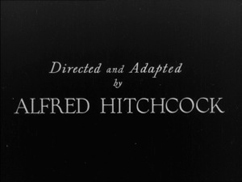 THE HITCHCOCK 9 (release dates 1926 - 1929) THE HITCHCOCK 9 (release dates 1926 - 1929) The Pleasure Garden (1926) The Lodger: A Story of the London Fog (1926) Downhill (1927) Easy Virtue (1927) The Ring (1927) The Farmer's Wife (1928) Champagne (1928) The Manxman (1929) Blackmail (1929) – silent version |
||
| Blackmail by Alfred Hitchcock |
||
|
Alice White (Anny Ondra) is engaged to the detective Frank Webber (John Longden), but she is bored. She takes advantage of a fight to take off with Crewe (Cyril Ritchard), a painter. But when Crewe tries to assault her, Alice, to defend herself, grabs a knife and stabs him. Hastily, she tries to erase the traces of her presence in the studio and flees. It is Frank who is on the investigation... United Kingdom, 1929, 1:16, black and white Director: Alfred Hitchcock Screenplay: Alfred Hitchcock, Charles Bennett, d'après la pièce Blackmail de Charles Bennett Photography: Jack Cox Editing : Emile de Ruelle Set decoration: C. Wilfred Arnold Production : John Maxwell, British International Pictures Ltd. Cast: Anny Ondra (Alice White), Sara Allgood (Mrs. White), Charles Paton (Mr. White), John Longden (Inspector Frank Webber), Donald Calthrop (Tracy), Cyril Ritchard (Mr. Crewe, the artist), Hannah Jones (Mrs. Humphries, the owner), Harvey Braban (chief inspector), Bishop (Sergeant), Percy Parsons (the perpetrator), Johnny Butt (Sergeant Bishop), Alfred Hitchcock (the man on the subway) Released in the United Kingdom (talkie): June 30, 1929 Released in the United Kingdom (silent): July 1929 |
||
| The National Orchestra of Lyon (the ONL) Heir to the Society of grand concerts in Lyon founded in 1905, the National Orchestra of Lyon became a permanent orchestra in 1969, with its first musical director, Louis Frémaux (1969-1971). Since then, it has been administered and funded by the City of Lyon, which provided it with a concert hall, the Auditorium, in 1975. For over a hundred years, the ONL has been led by prestigious conductors, from Charles Munch and André Cluytens, Sir John Eliot Gardiner and Marek Janowski, to Armin Jordan, Alan Gilbert, Georges Pretre or Neeme Järvi. Considered one of the finest European orchestras, the ONL has played alongside many world-renowned soloists such as Pablo Casals, Arthur Grumiaux, Wilhelm Kempff and more recently Yo-Yo Ma, Martha Argerich, Vadim Repin, Truls Mørk, Radu Lupu, Krystian Zimerman, Jean-Yves Thibaudet, ... 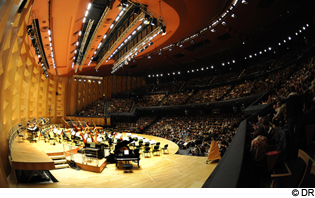 The Musical Creation Neil Brand has been accompanying silent films for nearly 30 years, regularly in London at the Barbican and NFT, throughout the UK and at film festivals and special events around the world, including Australia, New Zealand (three times), America, Israel, Sweden, Denmark, France, Germany, Ireland, Luxembourg, and, in Italy, the Bologna, Aosta, Bergamo and Pordenone festivals where he has inaugurated the School of Music and Image. He now has a very fruitful relationship with the BBC Symphony Orchestra which has resulted in London performances of his acclaimed orchestral score for Hitchcock’s silent ‘Blackmail’ (commissioned by Cinema Ritrovato, Bologna), the BBCSO / Barbican commission to score Asquith’s silent ‘Underground’ and a new adaptation of The Wind in the Willows for Orchestra and Actors for Radios 3 and 4 – all of these works orchestrated and conducted by maestro Timothy Brock. His Blackmail score was performed at the British Museum in a reduced ensemble arrangement for the London 2012 festival, and subsequently played the New Zealand Film Festival alongside his new score for Chaplin’s Easy Street. |
Conductor:
Leonard Slatkin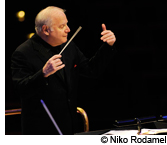 World-renowned maestro, American Leonard Slatkin has been Music Director of the National Orchestra of Lyon since September 2011. He has held the same position at the Detroit Symphony Orchestra since the 2008-2009 season. He has also been principal guest conductor of the Pittsburgh Symphony Orchestra since the fall of 2008. Mr. Slatkin is the author of a book entitled Conducting Business. Previously, he was head of the Symphony Orchestra of St. Louis (1979-1996) and the National Symphony Orchestra in Washington (1996-2008). He was also principal guest conductor of the London Philharmonic and the Royal Philharmonic Orchestra and principal conductor of the BBC Symphony Orchestra.
Since his debut with the New York Philharmonic in 1974, Leonard Slatkin has conducted all the major American orchestras, notably those of Chicago, Boston, San Francisco, Cleveland, Philadelphia, and Los Angeles, and he has performed with major European orchestras. Leonard Slatkin has recorded more than 100 records, has been awarded seven Grammy Awards and has received 64 Grammy nominations. Among other distinctions, he is a knight of the Legion of Honor. World-renowned maestro, American Leonard Slatkin has been Music Director of the National Orchestra of Lyon since September 2011. He has held the same position at the Detroit Symphony Orchestra since the 2008-2009 season. He has also been principal guest conductor of the Pittsburgh Symphony Orchestra since the fall of 2008. Mr. Slatkin is the author of a book entitled Conducting Business. Previously, he was head of the Symphony Orchestra of St. Louis (1979-1996) and the National Symphony Orchestra in Washington (1996-2008). He was also principal guest conductor of the London Philharmonic and the Royal Philharmonic Orchestra and principal conductor of the BBC Symphony Orchestra.
Since his debut with the New York Philharmonic in 1974, Leonard Slatkin has conducted all the major American orchestras, notably those of Chicago, Boston, San Francisco, Cleveland, Philadelphia, and Los Angeles, and he has performed with major European orchestras. Leonard Slatkin has recorded more than 100 records, has been awarded seven Grammy Awards and has received 64 Grammy nominations. Among other distinctions, he is a knight of the Legion of Honor. The Auditorium of Lyon The enormous fully-prestressed concrete monolith, the Auditorium of Lyon imposes its shape in the heart of the Part-Dieu neighborhood. Designed by Charles Delfante, urban planner and chief architect of the Part-Dieu, and by Henri Pottier, Grand Prix de Rome, the Auditorium was inaugurated on February 14, 1975, after more than three years of titanic work that required nearly 40 000 tons of concrete and 830 tons of steel! 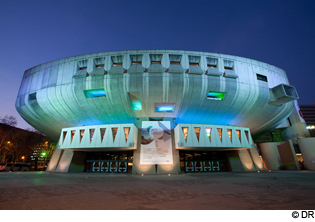 |
|
| Tickets on sale! 12 euros 10 euros for accredited members Ticket office, Lumière festival: +33 (0)4 78 76 77 78 - www.festival-lumiere.org Ticket office, Auditorium of Lyon : +33 (0)4 78 95 95 95 - www.auditorium-lyon.com Auditorium of Lyon : 149 rue Garibaldi – 69003 Lyon    from Monday, October 14 to Sunday, October 20, 2013 |
||
